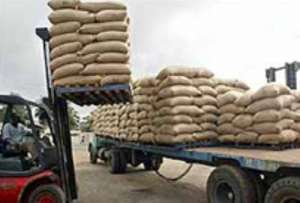
Cocoa exporters in the world's No. 1 grower Ivory Coast said they fear new government policies could seriously derail the season as a farmers' strike entered a fourth day on Thursday.
The 2008/09 harvest of the West African nation's main export earner started late and has already been disrupted by reshuffles to the agencies that regulate the sector, and disease in the fields, as well as industrial action.
Port-side arrivals of beans ready for shipment are less than half what they were at this stage last year, and deliveries from the bush to the county's two export terminals of Abidjan and San Pedro have been blocked by farmers since Monday.
They are demanding buyers pay the full 700 CFA francs ($1.37) per kilo as suggested by the government-appointed cocoa sector management committee, while buyers say that price is way above actual market levels -- an impasse which has brought trade to a standstill.
"It's difficult to understand how you can unilaterally fix an indicative farm-gate price which has no basis in reality, and not tell farmers that it is an indicative price and nobody is obliged to pay it," the director of a European exporting company in Abidjan said.
On Wednesday the cocoa advisory council, also appointed by the government, backed the farmers' action and said producers should hold firm in their demands for more money. Exporters are concerned that politics is overtaking commercial reality.
"Management has become politicised ... but it is the farmer who will pay in the end," the director of another international firm in capital Abidjan said.
The management committee, staffed by several former directors of now defunct state-run cocoa firm CAISTAB, was set up to oversee marketing body the Coffee and Cocoa Bourse after a corruption investigation paralysed activity there.
The committee slashed taxes on cocoa by more than 60 percent as one of its first moves, but has called on exporters to cut their profit margins.
"War of nerves"
Government price-setting has had disastrous effects on farmers' income in West African agriculture.
Two years ago exports of cashew nuts in Guinea-Bissau crashed as buyers refused to pay what they saw as an unacceptably high mandatory purchase price, and farmers ended up selling stock for much less money. Cashew nuts are the country's main cash crop.
Asking cocoa exporters to trim their margins in order to finance the higher prices and redistribute wealth to farmers was unrealistic, the director of an exporting firm in San Pedro said.
"Things don't work like that. This is business, and there are rules we respect. If tomorrow the market moves and allows us to pay 700 francs then we'll do that, but if the price is 300 francs like today, then that's what we'll pay," he said. Benchmark prices as set in New York have fallen by around 40 percent to $2,001 per tonne at Wednesday's close since hitting a long-term peak of $3,290 in July.
Reported prices at the farm gate in Ivory Coast's cocoa heartland of Soubre were at 450 CFA francs per kilo at the end of September, just days before the guideline price was set.
Against this background, buyers are refusing to pay anything close to 700 francs.
"This price cannot be imposed on everyone when it is not the case in today's market. Farmers should be told this, and they will stop dreaming," the San Pedro shipper said.
Jospeh Yao Kouame, president of the SAPIOCI union which called the strike has vowed to continue indefinitely, but buyers say sooner or later farmers will need money.
"It's a war of nerves and producers will end up selling beans at a much lower price than they want," an executive with an international exporting firm in Abidjan said.
"There is a huge amount of stock in the bush and the quality is terrible, so prices can't go anywhere but down."
Source: Reuters




 Former Kotoko Player George Asare elected SRC President at PUG Law Faculty
Former Kotoko Player George Asare elected SRC President at PUG Law Faculty
 2024 elections: Consider ‘dumsor’ when casting your votes; NPP deserves less — P...
2024 elections: Consider ‘dumsor’ when casting your votes; NPP deserves less — P...
 You have no grounds to call Mahama incompetent; you’ve failed — Prof. Marfo blas...
You have no grounds to call Mahama incompetent; you’ve failed — Prof. Marfo blas...
 2024 elections: NPP creates better policies for people like us; we’ll vote for B...
2024 elections: NPP creates better policies for people like us; we’ll vote for B...
 Don’t exchange your life for wealth; a sparkle of fire can be your end — Gender ...
Don’t exchange your life for wealth; a sparkle of fire can be your end — Gender ...
 Ghana’s newly installed Poland train reportedly involved in accident while on a ...
Ghana’s newly installed Poland train reportedly involved in accident while on a ...
 Chieftaincy disputes: Government imposes 4pm to 7am curfew on Sampa township
Chieftaincy disputes: Government imposes 4pm to 7am curfew on Sampa township
 Franklin Cudjoe fumes at unaccountable wasteful executive living large at the ex...
Franklin Cudjoe fumes at unaccountable wasteful executive living large at the ex...
 I'll 'stoop too low' for votes; I'm never moved by your propaganda — Oquaye Jnr ...
I'll 'stoop too low' for votes; I'm never moved by your propaganda — Oquaye Jnr ...
 Kumasi Thermal Plant commissioning: I pray God opens the eyes of leaders who don...
Kumasi Thermal Plant commissioning: I pray God opens the eyes of leaders who don...
